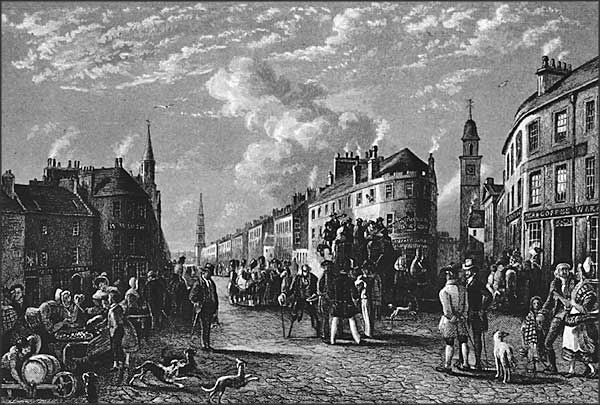
Following their lectures in Ayr on the Monday and Tuesday evenings, Frederick Douglass and James Buffum travelled fifteen miles north east to Kilmarnock, where they held three more meetings.
On Wednesday 25 March, they addressed an audience at the George Inn Hall (marked blue on the map below). The following evening they lectured at Clerk’s Lane Chapel (marked yellow), the Evangelical Union church whose minister Rev. James Morison chaired proceedings. On Friday they held a meeting in the Church of Scotland’s Low Church (marked green).
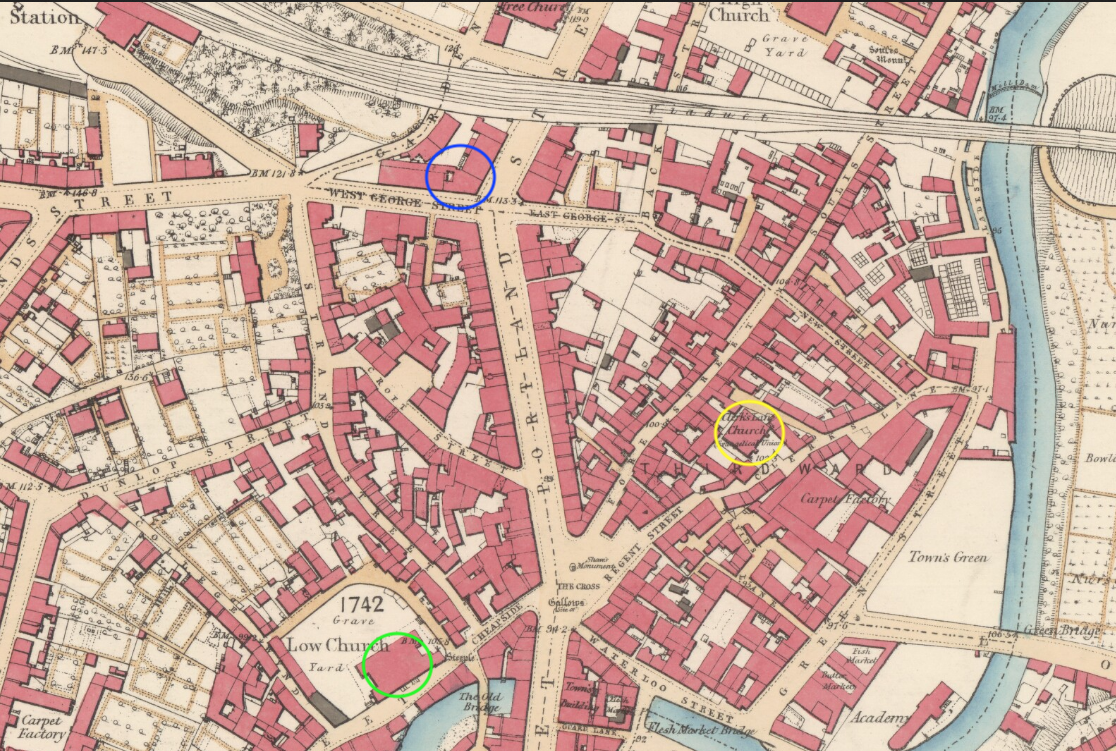
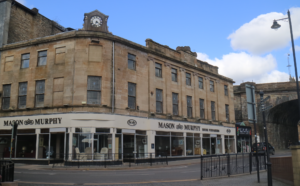
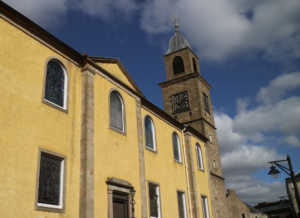
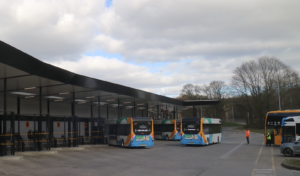
We reproduce below the reports of these meetings in the Kilmarnock Herald (twice), the Ayr Advertiser and the Ayr Observer (which has the Low Church as the venue on the Thursday). The second report in the Kilmarnock Herald indicates that Douglass returned the following week.
ANTI-SLAVERY LECTURES. – Lectures on slavery were this week delivered in town by a Mr Frederick Douglass, a self-emancipated slave from the ‘Land of Liberty!’ A good deal of interest was excited on the subject, from the circumstances of the lecturer being a man of colour. The places of meeting were packed by very respectable audiences. Mr William Muir, bookseller, occupied the chair. Mr Douglass is a young man, and, notwithstanding the negro cast of his features, is prepossessing beyond the generality of his race. On the first evening (Wednesday,) when we were present, his address was pathetic, at all times, and occasionally brilliant. From a man born and bred under such disadvantages as he professed, and, doubtless, truthfully, to have been, we certainly were very far from prepared for such a powerful appeal, couched, as it was, in the most correct language, clearly enunciated, and eloquently enforced. Several pitiful disclosures were made, alike to the degradation of the Government which sanctions, and to the people who look on in submission. Well might Mr Douglass quote the lines by the author of the ‘Pleasures of Hope:’–
America, thy banner bears
Two emblems – one of fame,
Alas! the other that it bears
Reminds us of your shame.
The white man’s liberty in types.
Stands blazoned by your stars;
But what’s the meaning of these stripes?
They mean your negroes’ scars.1
It is to be hoped that Brother Jonathan will speedily wipe away this foulest spot from the shores of the New World; and that, till this is done, Britain will plead with a voice of thunder.
Kilmarnock Herald, 27 March 1846
ANTI-SLAVERY LECTURES.– On Wednesday, Mr Frederick Douglass, one of that ill-treated and unhappy class of men whom our Transatlantic brethren in the southern states are so zealous to retain in their degraded bondage, having happily freed himself from the condition of his co-mate in servitude, delivered a lecture in the George Inn Hall. On Thursday, he again lectured in the Low Church. The audience were admitted by tickets, and it is understood that about two thousand were sold, so that the church was densely filled. The topics of his lecture were the same as reported in another part of to-day’s sheet.2 The audience was composed of men of all sects; but a great proportion belonged to the Dissenters, who loudly cheered him in his severe castigation of the conduct of the Free Church.
Ayr Observer, 31 March 1846
ANTI-SLAVERY MEETING. – Messrs Douglas and Buffum, the American Deputation to this country in aid of the Anti-Slavery cause, visited Kilmarnock on Wednesday, lecturing that evening in the George Inn Hall, on Thursday evening in Clerk’s Lane Chapel, and on Friday evening in the Low Church. The chair was filled successively by Mr Muir, bookseller, the Rev. Mr Morrison, and Mr Andrew Aitken, cloth merchant. The meetings were all of the most enthusiastic character, and the eloquent appeals of Mr Douglas in behalf of his suffering friends on the other side of the Atlantic, created a powerful feeling in the minds of his audiences against that horrid and most iniquitous system. Friday evening was more particularly devoted to the consideration of the question ‘Should the Free Church of Scotland send back the money received from the slaveholding States?’ It was discussed by both gentlemen in an able, yet temperate, manner. At the close the Rev. Mr Morrison proposed two remonstrances foundd upon the three nights’ lectures, and, after Mr Buffum had shown the various instruments of torture, made use of by the slave masters, the meeting dismissed.
Ayr Advertiser, 2 April 1846
LECTURE ON SLAVERY.– Mr Frederick Douglass an emancipated American slave, whose lectures of Wednesday and Thursday of that week we noticed in last Herald appeared again, on Friday evening, before a large and respectable audience, in the Low Church – Mr Andrew Aitken, cloth merchant in the chai. With the exception of a comment upon the acceptance by the Free Church of mon[i]es from slave-holders in the States, the lecture way [sic] similar to the others in point of detail. The narration of the tortures put upon the sons and daughters of American bondage were pitiful in the extreme. In the most prominent incidents in his history, with which Mr Douglass favoured his audience, there appears an interest seldom observable in the life of a negro. We are glad to have an opportunity of stating to the honour of our town that from men of all denominations Mr Douglass has not gone unnoticed. At the meeting of Friday night several strong and important resolutions, condemnatory of the slave system, were unanimously adopted. Since the above was in type, we observe that a soiree is to be given to-night in honour of Messrs Douglas and Buffum, in Clerk’s Lane Chapel.
Kilmarnock Herald, 3 April 1846
Notes
- Thomas Campbell, ‘The United States of North America’ in The Poetical Works of Thomas Campbell (Philadelphia: Lea and Blanchard, 1845), p. 318. Douglass quoted this poem in several speeches.
- A report of the anti-slavery meeting in Ayr on 24 March appeared in the same issue.